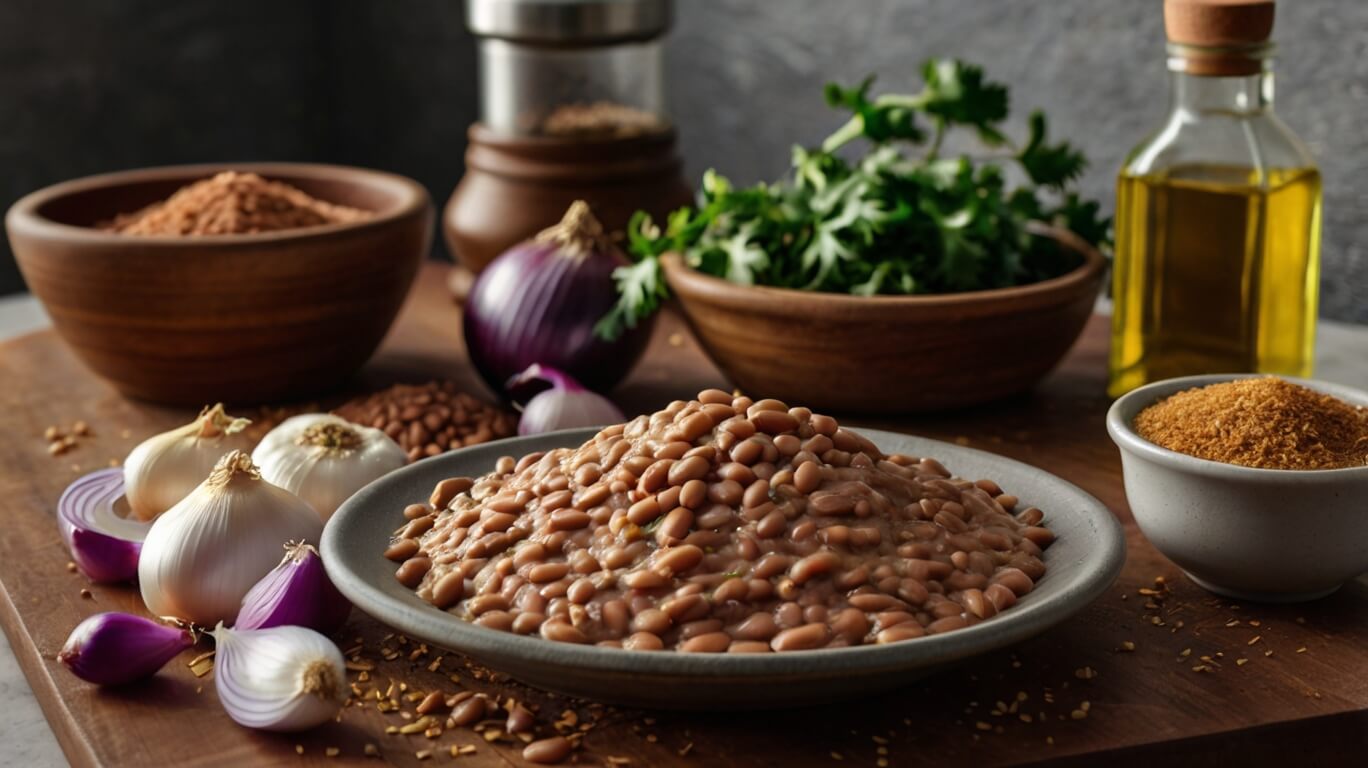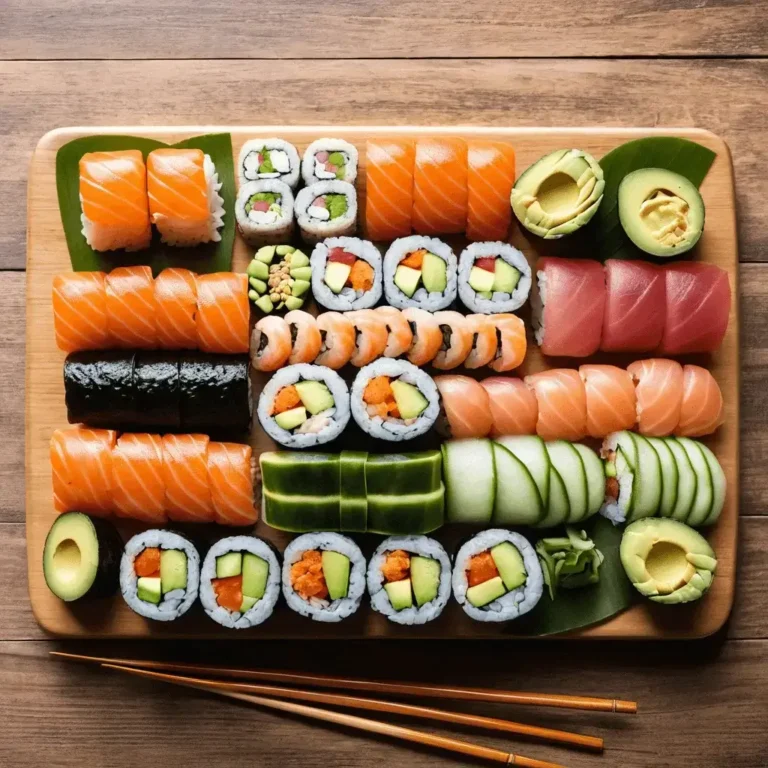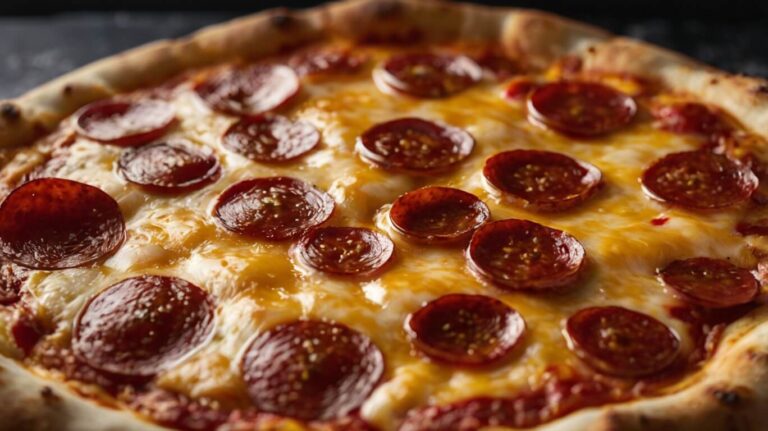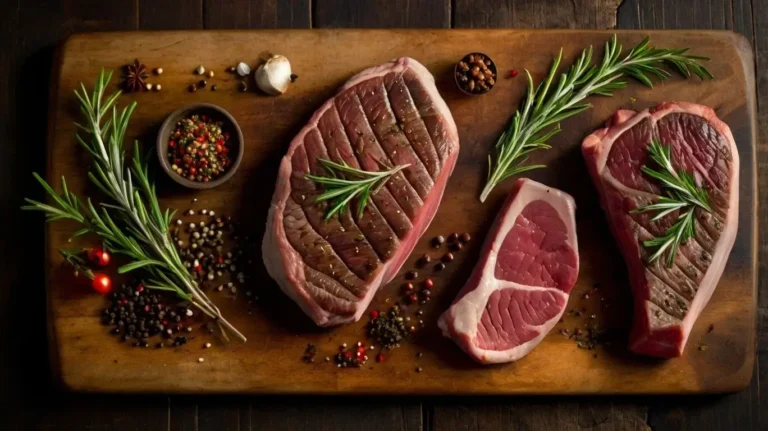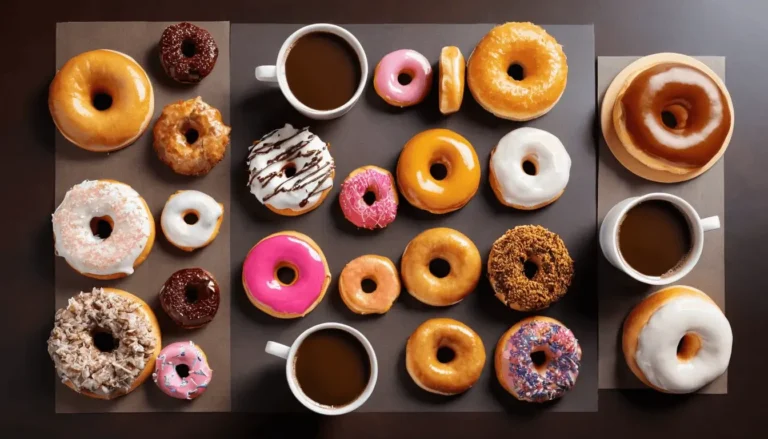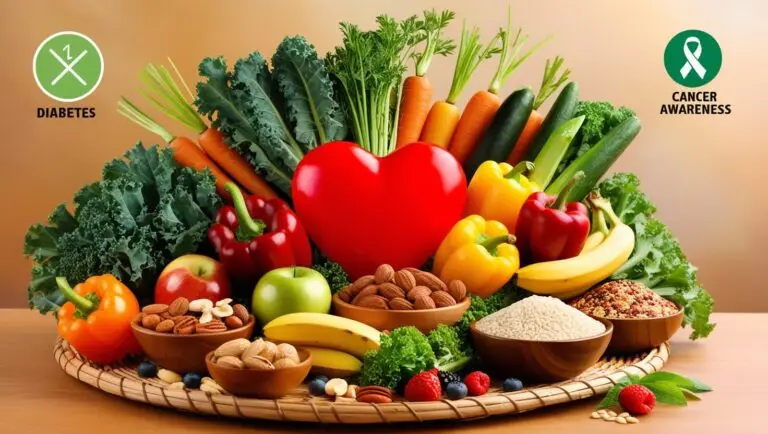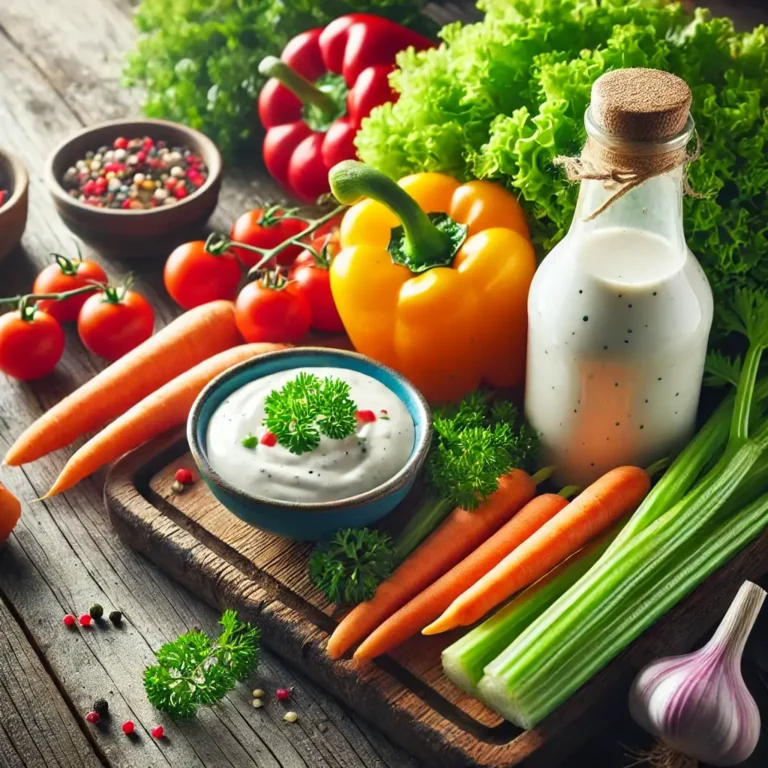Refried Beans Nutrition Facts: Are They as Healthy as You Think?
Refried Beans Nutrition Facts: Refried beans are a staple in Mexican cooking. According to Mayo Clinic’s Healthy Eating Guide, legumes like refried beans are an excellent addition to a well-rounded diet. People enjoy their creamy texture and savory goodness. They often come from pinto beans, but black beans, kidney beans, or lentils can be used too. Learning about refried beans’ nutritive value lets us choose wisely in our daily diet since they are solid sources of protein and fiber. If you’re new to incorporating healthier food choices into your lifestyle, you might find our Home Workouts Guide helpful for staying active alongside a balanced diet. Let’s examine their nutrition, benefits, and diet customization.
Nutrition Breakdown
The nutrient content varies with cooking methods and bean types. For a rough estimate, one cup of refried pinto beans made with lard contains:
- Calories: 220
- Protein: 12 grams
- Total Fat: 8 grams
- Saturated Fat: 3 grams
- Trans Fat: 0 grams
- Carbohydrates: 34 grams
- Dietary Fiber: 9 grams
- Sugars: 1 gram
- Iron: 7 mg (39% of Daily Value)
- Calcium: 60 mg (6% DV)
- Magnesium: 60 mg (15% DV)
- Potassium: 800 mg (23% DV)
- Folate: 150 mcg (38% DV)
Daily Value percentages are for a 2,000-calorie diet. Your recipe can change these numbers.
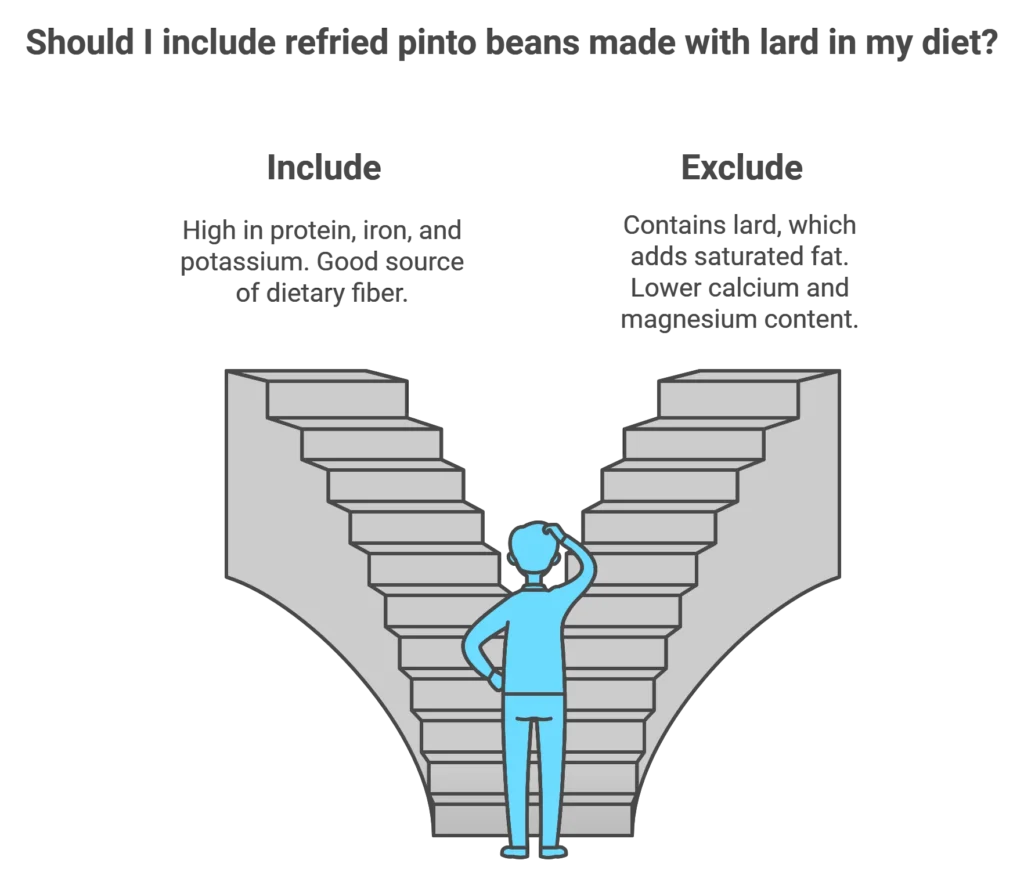
Essential Nutrients : Refried Beans Nutrition Facts
- Protein Power:
- Refried beans are loaded with plant protein, awesome for vegetarians or meat-reducers. Protein is key for muscle repair and body functioning, and beans offer the essential amino acids your cells need.
- Fiber Friends:
- Bursting with dietary fiber, they aid digestion and help keep blood sugar even-keeled. Since fiber promotes fullness, it’s useful for weight control. Plus, plenty of fiber reduces risks for heart disease and diabetes.
- Vibrant Vitamins and Minerals:
- They’re full of vital vitamins and minerals, like iron for blood oxygenation, calcium for bones, potassium for blood pressure control, and folate for cell growth—packing a punch for overall health.
- Smart Fats:
- Old-school recipes might call for lard, but modern twists using olive or avocado oil inject healthier fats. These good fats are important for nutrient uptake, cellular function, and hormonal balance.
Health Perks of Refried Beans
Adding refried beans to your plate brings multiple health pluses:
Nutrient-Dense Wonder
- These beans are powerhouses with top-notch protein and fiber, without the calorie overload. They fit into any meal, from breakfast burritos to supper tacos. For more meal planning ideas, check out our guide on Staying Motivated to Achieve Long-Term Goals to keep your fitness journey on track. They’re a go-getter for a healthier, longer life.
Cardiovascular Champion
- The fiber aids in reducing cholesterol and keeping a hearty heart. Beans high in potassium maintain even blood pressure, aligning with a strong ticker.
Digestive Dynamo
- Their fiber kicks digestion into gear, promoting regularity and fending off constipation. Eating them often nurtures a healthier gut for smoother overall digestion.
Weight Solution
- These beans help regulate weight by keeping hunger in check. Alongside staying active, they can beef up a healthy lifestyle. Low-fat refried beans are an excellent option for those aiming to reduce fat intake.
Cholesterol-Free Boost
- Refried beans are naturally cholesterol-free, making them an ideal choice for maintaining heart health and reducing the risk of heart disease.
Glycemic Index Friendly
- With a low glycemic index, refried beans help stabilize blood sugar levels, making them a smart choice for people managing diabetes or looking to maintain even energy levels throughout the day.
Culinary Chameleons
- You can throw refried beans into anything from burritos to salads. Their mild taste sneaks nutrition into dishes without stealing the spotlight, adding depth and nutrients without a fuss.
A Word on Sodium and Fats
Go easy on refried beans when considering sodium and fat:
Sodium Awareness
- Watch for sodium in canned or restaurant varieties. Stick with low-sodium options or whip up your own to dodge the sodium bullet while snagging all the health perks. You can find helpful tips for reducing sodium in canned foods at Heart.org. Canned refried beans can be convenient, but always check the sodium content to ensure it fits your dietary guidelines.
Fat Checks : Refried Beans Nutrition Facts
- Lard ups the saturated fat, so cook with oil or water to keep fat reasonable. This adjustment ensures you savor the beans’ deliciousness without friending fats you don’t need. Low-fat or vegetarian refried beans made with healthy oils are great alternatives for a balanced diet.
Easy Homemade Refried Beans
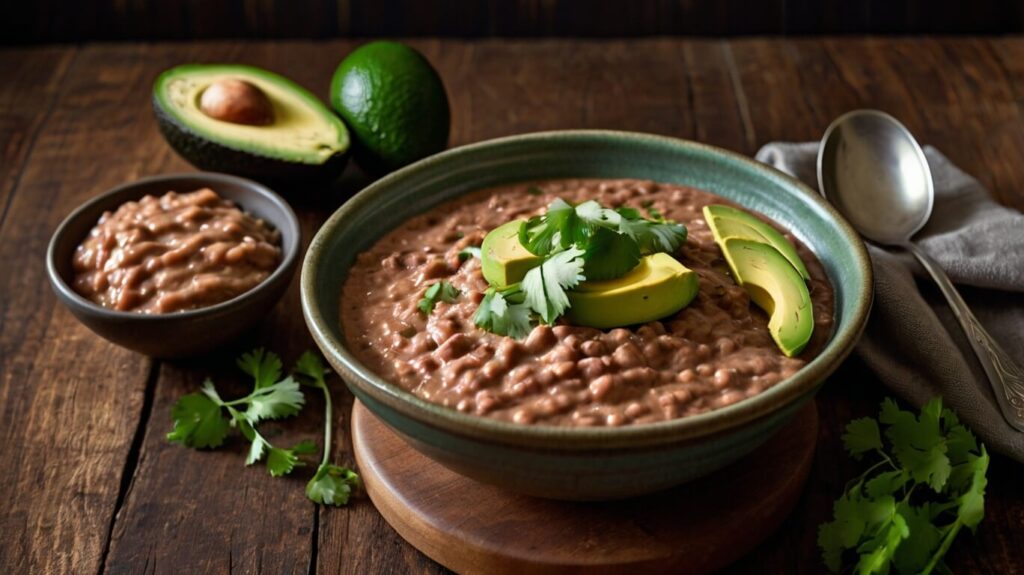
Whipping up refried beans at home is a breeze and ensures a tasty, quality dish. Here’s how you do it:
Ingredients:
- 2 cups cooked pinto beans (or canned, rinsed)
- 2 tablespoons olive oil (go easy for a lighter version)
- 1 onion, chopped
- 2 garlic cloves, minced
- 1 teaspoon cumin (optional)
- Salt and pepper to taste
- Water or vegetable broth
Directions:
- Sauté Onions and Garlic:
- Fire up some olive oil in a pan. Throw in onions and cook ’em till they’re clear—about five minutes. Add garlic for a minute until it smells great; it’ll pump up the flavor.
- Mash Your Beans:
- Drop in the beans and mash ’em up. You’re shooting for a mix of smooth and chunky. It adds interest to the texture!
- Customize:
- Mix in water or broth to get that smooth texture you’re after. Feel like spicing it up? Add cumin and season with salt and pepper to taste.
- Cook and Serve:
- Cook that mash for another 5 to 10 minutes, give it an occasional stir. When it’s time to dish out, top it with fresh cilantro or avocado for an extra kick!
Storage Tips
- Store leftover refried beans in an airtight container in the refrigerator for up to 3-4 days. You can also freeze them for longer storage. To reheat, add a splash of water or broth to bring back their creamy texture.
Recipe Ideas
- Use homemade refried beans as a filling for tacos, a topping for nachos, or as a base for a nutritious bean dip. They also work great as a side dish for grilled meats or in a layered burrito bowl.
Refried beans bring flavor and health together, crowning them a friend to your wellbeing. Thoughtful choices in making or buying them unlock benefits like protein, fiber, and key vitamins and minerals. Mix ’em into various dishes for nutritious and thrilling eating experiences. You can also explore the Vegan Nutrition Health Benefits for more insights into plant-based eating. Stay savvy with your prep and enjoy the delightful ways these beans can jazz up your plates!
Healthy Eating Habits and Portion Control
Refried beans are nutritious, but portion control is key to keeping calorie count and sodium content in check. A standard serving size is about half a cup, which provides ample nutrients without overloading on calories. Including legumes like refried beans in your meal planning ideas ensures a balanced, nutrient-dense diet that supports heart health, digestive health, and muscle growth while catering to dietary restrictions like vegetarianism and gluten-free options.
Frequently Asked Questions (FAQ)
Are refried beans healthy for you?
Yes, refried beans can be healthy when prepared with minimal unhealthy fats and low sodium. They are high in protein, fiber, and essential vitamins and minerals, making them a nutritious addition to a balanced diet.
Are refried beans a carb or protein?
Refried beans are both a carbohydrate and a protein source. They contain complex carbohydrates for energy and are rich in plant-based protein, which is great for muscle growth and overall health.
Can diabetics eat refried beans?
Yes, diabetics can eat refried beans. They have a low glycemic index, which helps manage blood sugar levels. Opt for homemade or low-sodium versions to keep them diabetes-friendly.
Which is healthier, refried beans or rice?
Refried beans are generally healthier than rice because they are higher in protein and fiber, which help keep you fuller for longer. They also have more essential vitamins and minerals, making them a more nutrient-dense choice.
Are refried beans junk food?
No, refried beans are not junk food. When made with healthy ingredients, they are a nutritious and wholesome food rich in protein, fiber, vitamins, and minerals. Avoid versions made with lard or excessive sodium to keep them healthy.
What are refried beans made of?
Refried beans are typically made from pinto beans or black beans that are cooked, mashed, and then fried with oil, onions, garlic, and seasonings. They can be made with different oils, such as olive or avocado, to keep them healthier.
